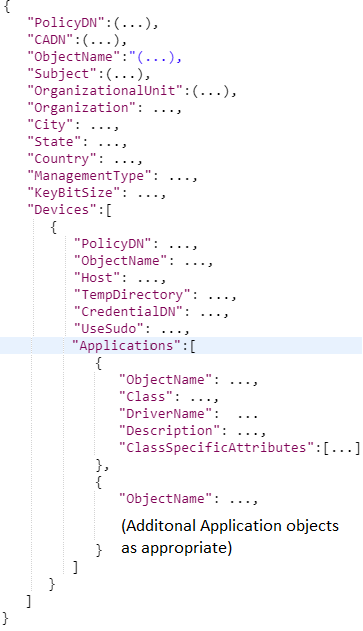Certificates/Request Applications parameters for provisioning
POST Certificates/Request uses Applications to allow vendor libraries, like GSK, to provision and manage keys and certificates on devices. The following diagram shows a generic Certificates/Request for provisioning. Each Devices element has Applications with zero or more Application objects. Each object provides data for a vendor library, like GSK, to use in provisioning and managing keys and certificate stores on devices. Application objects can use the same certificate. If more than one device uses the same certificate, Trust Protection Foundation centrally manages the certificate. For more information, see Example 4: Provisioning.

Parameters
As part of POST Certificates/Request, the following Applications parameters are available.
|
Name |
Description |
|||
|---|---|---|---|---|
|
Applications (Optional) |
Approvers: An array of one or more users or groups who are certificate approvers. Approvers have an Active Directory (AD), Light Directory Access Protocol (LDAP), or local identity. To get this information, use response data from POST Identity/Browse. The parameters are:
|
|||
|
Class: (Optional) The class name for the Trust Protection Foundation application driver. Corresponds with the DriverName. TIP A value that matches a supported provisioning Application. If the Application is not listed, specify Basic.
|
||||
|
ClassSpecificAttributes: (Optional) One or more Application object attributes that describe how to provision the certificate. Use Name and Value pairs. For help with Certificate parameters, see X509 Certificate CA Specific Attributes. For all parameter names, see the corresponding topic in the Web SDK Object class reference. |
||||
|
Contacts: (Optional)An array of one or more users or groups who receive event notifications. The events notify people about certificate expiration and validation failures: Contacts have an AD, LDAP, or local identity. To get this information, use response data from POST Identity/Browse. The parameters are:
|
||||
|
Description: (Optional) The description for this software application. |
||||
|
DriverName:The driver name. Corresponds with the Class: TIP A value that matches a supported provisioning Application. If the Application is not listed, appbasic.
|
||||
|
ObjectName: (Optional) A name for the Application object. |
||||
|
Validationhost: (Optional) The IP or domain name of the host that provides a certificate for this software application. |
||||
|
ValidationPort: (Optional) The port number for the host that provides a certificate for this software application. |